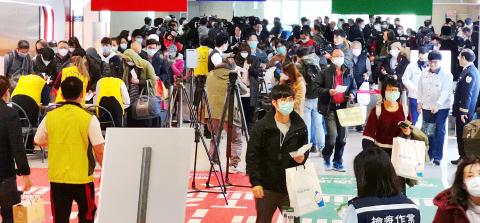While the Philippines has lifted its travel ban against Taiwanese visitors, five other countries continue to bar Taiwanese or ask them to provide medical clearance after arrival, amid the COVID-19 outbreak, International Air Transportation Association (IATA) data showed yesterday.
While Italy has banned flights by Taiwan-based airlines, it was not included in the IATA announcement, as the association looked at only passport and visa requirements.
Mauritius, Bangladesh and Mongolia, along with two of the nation’s former diplomatic allies, the Solomon Islands and Vanuatu, have imposed a variety of bans or time restrictions on travelers.

Photo:Tony Yao, Taipei Times
As of Feb. 6, Mauritius has barred entry to passengers who reside or have been in Taiwan, China, Hong Kong or Macau in the 14 days prior to their scheduled arrival.
As of Monday last week, Mongolia is not allowing travelers who live in or have been to those four places since Jan. 1 to enter the country or to transit, although the policy does not apply to people who reside in Mongolia.
Solomon Islands does not allow passengers who have visited China or transited through it in the 14 days prior to their scheduled arrival to enter the country.
While it allows entry of passengers transiting through Fiji, Kiribati, Nauru, Papua New Guinea or Vanuatu, it requires these passengers to present evidence that they have not been in or transited through Taiwan in the previous 14 days, along with 20 other nations where there have been confirmed cases of COVID-19.
Vanuatu on Monday last week announced that people who have been to Taiwan, China, Hong Kong or Macau in the 14 days prior to their arrival are not allowed to enter the country.
It is also requiring travelers who have been in any of the four since Dec. 31 last year, but who have spent the previous 14 days outside of them, to supply a copy of Medical Clearance Form 1, issued by a registered medical practitioner certifying that they are free from any respiratory illness.
Bangladesh is no longer issuing visas on arrival to Chinese nationals, as well as passengers with a Republic of China, Hong Kong or Macau passport, and passengers arriving from any of the four must fill in a health clearance form provided by their airline cabin crew.
Samoa requires passengers who have transited through or have been in Taiwan, Australia, Canada, France, Germany, South Korea, Malaysia, Vietnam, the United Arab Emirates or California to obtain a medical clearance issued by a registered medical practitioner three days before their arrival.
The Ministry of Foreign Affairs has said that Taiwanese headed for Vietnam should bring a copy of an entry-and-exit permit from the National Immigration Agency that lists their travel history in the previous 14 days to prove that they have not visited China recently.
If they are to visit other nations before arriving in Vietnam, they should make sure that the immigration officials in those countries have clearly stamped their passports, the ministry said.

Intelligence agents have recorded 510,000 instances of “controversial information” being spread online by the Chinese Communist Party (CCP) so far this year, the National Security Bureau (NSB) said in a report yesterday, as it warned of artificial intelligence (AI) being employed to generate destabilizing misinformation. The bureau submitted a written report to the Legislative Yuan in preparation for National Security Bureau Director-General Tsai Ming-yen’s (蔡明彥) appearance before the Foreign Affairs and National Defense Committee today. The CCP has been using cognitive warfare to divide Taiwanese society by commenting on controversial issues such as Taiwan Semiconductor Manufacturing Co’s (TSMC, 台積電) investments in the

HELPING HAND: The steering committee of the National Stabilization Fund is expected to hold a meeting to discuss how and when to utilize the fund to help buffer the sell-off The TAIEX plunged 2,065.87 points, or 9.7 percent, to close at 19,232.35 yesterday, the highest single-day percentage loss on record, as investors braced for US President Donald Trump’s tariffs after an extended holiday weekend. Amid the pessimistic atmosphere, 945 listed companies led by large-cap stocks — including Taiwan Semiconductor Manufacturing Co (TSMC, 台積電), Hon Hai Precision Industry Co (鴻海精密) and Largan Precision Co (大立光) — fell by the daily maximum of 10 percent at the close, Taiwan Stock Exchange data showed. The number of listed companies ending limit-down set a new record, the exchange said. The TAIEX plunged by daily maxiumu in just

INVESTIGATION: The case is the latest instance of a DPP figure being implicated in an espionage network accused of allegedly leaking information to Chinese intelligence Democratic Progressive Party (DPP) member Ho Jen-chieh (何仁傑) was detained and held incommunicado yesterday on suspicion of spying for China during his tenure as assistant to then-minister of foreign affairs Joseph Wu (吳釗燮). The Taipei District Prosecutors’ Office said Ho was implicated during its investigation into alleged spying activities by former Presidential Office consultant Wu Shang-yu (吳尚雨). Prosecutors said there is reason to believe Ho breached the National Security Act (國家安全法) by leaking classified Ministry of Foreign Affairs information to Chinese intelligence. Following interrogation, prosecutors petitioned the Taipei District Court to detain Ho, citing concerns over potential collusion or tampering of evidence. The

‘COMPREHENSIVE PLAN’: Lin Chia-lung said that the government was ready to talk about a variety of issues, including investment in and purchases from the US The National Stabilization Fund (NSF) yesterday announced that it would step in to staunch stock market losses for the ninth time in the nation’s history. An NSF board meeting, originally scheduled for Monday next week, was moved to yesterday after stocks plummeted in the wake of US President Donald Trump’s announcement of 32 percent tariffs on Taiwan on Wednesday last week. Board members voted to support the stock market with the NT$500 billion (US$15.15 billion) fund, with injections of funds to begin as soon as today. The NSF in 2000 injected NT$120 billion to stabilize stocks, the most ever. The lowest amount it